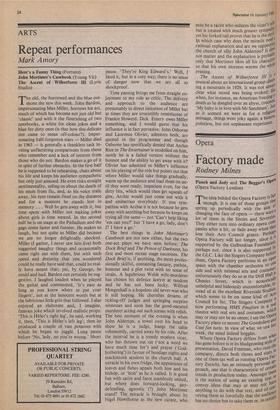ARTS
Repeat performances
Mark Amory
Here's a Funny Thing (Fortune)
The old, the borrowed and the blue out- shone the new this week. John Bardon, impersonating Max Miller, borrows his act, much of which has become not just old but `classic' and with it the flourishing of two notebooks, a white for clean jokes and a blue for dirty ones (is that how this delicate tint came to mean off-colour?). Imper- sonating half-forgotten stars — Miller died in 1963 — is generally a thankless task in- viting unflattering comparisons from those who remember and a lack of interest from those who do not. Bardon makes a go of it in spite of further obstacles. In the first half he is supposed to be rehearsing, chats about his life and keeps his audience sympathetic but only just amused. He even risks straight sentimentality, telling us about the death of his mum from flu, and, as his voice trails away, his eyes remain fixed on the distance and for a moment he stands lost in memory . . . Well he gets away with it, but time spent with Miller not making jokes about girls is time wasted. In the second half he is on stage at the Palladium and the gags come faster and funnier. He makes us laugh, but not quite as Miller did because we are no longer delightedly shocked. Miller (I gather, I never saw him live) both suggested naughty things and occasionally came right out with them, but with such speed and dexterity that you wondered could he really have said that, could he real- ly have meant that; yes, by George, he could and had. Bardon can certainly be sug- gestive. I laughed loudest when he played the guitar and commented, 'It's easy as long as you know where to put your fingers', not at the innocent words but at the lubricious little grin that followed. I also enjoyed an elaborate and, I imagine, famous joke which involved realistic props: `This is Hitler's right leg', he said, working it, then, 'This is Hitler's left leg'; then he produced a couple of vast potatoes with which he began to juggle. Long pause before `No, lady, no you're wrong.' Short
pause. 'They're King Edward's.' Well, I liked it, but in a cosy way; there is no sense of danger now that we are all so shockproof.
Time passing brings me from straight en- joyment to my role as critic. The delivery and approach to the audience are presumably in direct imitation of Miller but at times they are irresistibly reminiscent of Frankie Howerd. Dick Emery owes Miller something, and I would guess that his influence is in fact pervasive. John Osborne and Laurence Olivier, admirers both, are quoted in the programme and though Osborne has specifically denied that Archie Rice in The Entertainer is modelled on him, surely he is a failed version without the bounce and the ability to get away with it? Olivier has admitted to Miller's influence on his playing of the role but points out that where Miller would take things gradually, warm up the audience and lead them on un- til they were ready, impatient even, for the dirty bits, which would then get squeals of glee, Archie would just come out with it and embarrass everybody. If you sym- pathise with Archie it is not because he gets away with anything but because he keeps on trying all the same — not 'Can't help liking 'em can you?' but 'I have a go, lady, don't I? I have a go.'
The best things in John Mortimer's Casebook are not new either, but the two one-act plays we have seen before: The Dock Brief and The Prince of Darkness, his first and most recent stage successes. The Dock Brief is, if anything, the more profes- sionally skilful, containing fantasy, pathos, humour and a plot twist with no sense of strain. A lugubrious Welsh wife-murderer has chosen his defence lawyer at random and he has not been lucky. Wilfred Morgenhall is a hopeless old never-was who is still hoping. He cherishes dreams of ticking-off judges and springing surprise witnesses and soon has the good-natured murderer acting out such scenes with relish. The best moment of the evening is when John Aldertqn, a towel over his head to show he is a judge, bangs the table vehemently, carried away by his role. After the interval he is a trendy modern vicar, who has thrown out sin (`not a word we have much time for') and prayer (`God- bothering') in favour of bondage nights and mackintosh sessions in the church hall. A miracle in his own fridge, the appearance of loaves and fishes appals both him and his bishop, or 'bish' as he is called. It is good fun with satire and farce seamlessly united, but where does forward-looking, gay- defending, agnostic (?) John Mortimer stand? The miracle is brought about by Nigel Hawthorne as the new curate, who may be a racist who seduces the vicar's wife, but is treated with much greater symPat9' yet his forked tail proves that he is the de In which case why does the miracle need 3 rational explanation and are we supPori! the church of silly John Alderton? It dee,' not matter and the explanation is probabl) only that Mortimer likes all his character. so that his own niceness warms the whr)le evening. The Ascent of Wilberforce III is a musical about an international group climb ing a mountain in 1929. It was not always clear what mood was being evoked; like when, for instance, an American freezing ti death as he dangled over an abyss, crooned, `My baby is in love with Mr Sandman'. Just as it seemed we were in for a religi°; message, things 'went joky again; a bizarre' pointless, but not unpleasant experience.


































 Previous page
Previous page